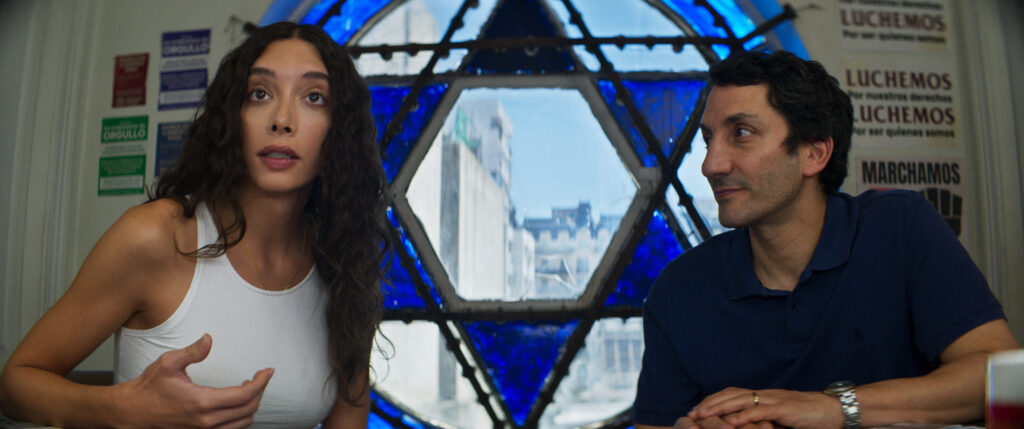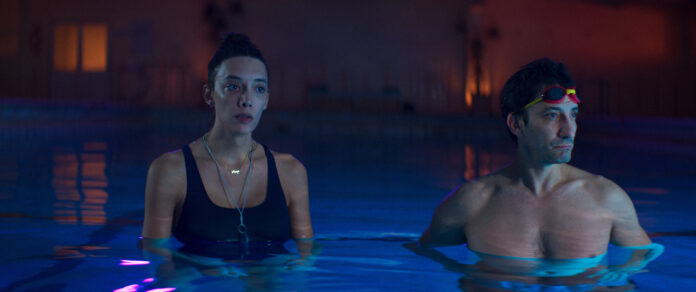“Transmitzvah,” now available on Netflix, is an offbeat consideration of identity vis-a-vis the Jewish rite-of-passage of adulthood. Like the main character, this Argentine comedy-drama, directed by Daniel Burman, who wrote the screenplay with Ariel Gurevich, does not follow a simple path to having a Bar or Bat Mitzvah. While the diversions make things interesting, the tone is very uneven.
In the pre-title sequence, Rubén Singman (Milo Burgess) declares, “Everything is about to change!”—and it does. After performing a song for his family in makeup, a dress, and heels, Rubén tells his father, Arón (Alejandro Awada), that he won’t have a Bar Mitzvah. Instead, he wants a Bat Mitzvah as a girl, explaining that presenting as male feels “dishonest.”
Arón responds that he loves and supports his child, and his concern is not about gender. Instead, he asserts that the name Rubén is a prophecy, a reflection of his child’s soul, and a source of honor. He asks Rubén to respect that and then do whatever he wants after the ceremony. Rubén, adamantly says no, and no to the Bar Mitzvah altogether — and, showing his moxie, not in a nice way.
“Transmitzvah” jumps years ahead in time and Rubén is now Mumy Singer (trans actress Penélope Guerrero), who has achieved considerable success as a Yiddish performer, (re)named after her grandmother and the sewing machine. Returning home, with her partner, Sergio (Gustavo Bassini), and her four backup dancers in tow, Mumy reunites with her older brother, Eduardo (Juan Minujín), their mother, Miriam (Alejandra Flechner), and her dying father. It is an initially awkward reunion, but Mumy and Arón discuss forgiveness before he passes away.
However, when Mumy loses her father, she also loses her voice. The only way to regain her ability to sing, it’s decided, is to finally have her Bat Mitzvah as an adult. Mumy enlists Eduardo to help her accomplish this goal because, “The road forward is a journey backward.”
Burman’s film is at its best when depicting Mumy’s efforts to become a Bat Mitzvah, in part because it depicts the renewed relationship between the adult siblings. Like Mumy, Eduardo is adrift — he is planning to get divorced from his wife Sandra (Carla Quevedo) — and helping Mumy find a sense of purpose may give him one too.
The dynamic between Mumy and Eduardo is playful as they find a pair of old walkie-talkies that need batteries. That hunt drives them to the Jewish neighborhood of Once in Buenos Aires and Lucho (Andrés Ciavaglia) and his husband, who is also named Lucho (Agustín Scalise). A nice moment has the latter Lucho intuiting Eduardo’s troubled marriage. This echoes Mumy’s efforts to find her way through encounters with a Wing Chun practitioner, Papadópolus (Carlos Belloso), who divines a cryptic message for her about being on the right path which ends where it started.
The most critical scenes have Mumy and Eduardo interviewing possible Rabbis for her ceremony. One, Garfunkel (Abiá Vainstein), mentions the word “tolerate” which prompts Mumy to respond that she is not to be “tolerated,” like gluten or lactose and literally drops a mic before storming out. Another Rabbi, Graciela (Marina Cohen) offers a Benei Mitzvah for ungendered or genderfluid Jews who use they/them pronouns, and allows women to wear the tefillin straps and boxes containing parchment scrolls, which are worn (only) by men. However, Mumy rejects this, and claims she wants “no shortcuts.” These episodes mine gentle if pointed humor as they speak to how Judaism is trying to be inclusive, however clumsily, of the LGBTQ+ community by letting folks “be the Jew they want to be,” as Graciela says. Berman’s film suggests that these efforts are both fake and tone deaf, and the same point can be applied to members of the trans or queer community, who do not need other people’s permission to be who they are.

“Transmitzvah” does, however, feel overstuffed as it repeatedly makes the same points about identity and religion, which dilutes the film’s power. A scene set in a swimming pool has Eduardo and Sergio explaining numerology to a skeptical Mumy, while another scene has Eduardo advocating about Abulafia (a prophet of the Kabbalah). These scenes lead the siblings down an(other) unexpected path that eventually has them recalling their Hebrew names, another symbol of identity.
As the siblings try to find meaning and the best way to express themselves, they also perform songs and dance. A fabulous musical sequence has Mumy, Eduardo and others singing in the streets. In addition, a cute scene features Miriam giving Sergio and Mumy’s backup dancers choreography for the Bat Mitzvah. But these episodes, while fun, feel unnecessary.
Berman may overreach trying to keep all the elements in play as the story unfolds, but his efforts are honorable. Both Guerrero and Minujín deliver solid performances as Mumy and Eduardo and watching them grow as their identities develop is what makes the underwhelming “Transmitzvah” worthwhile.
